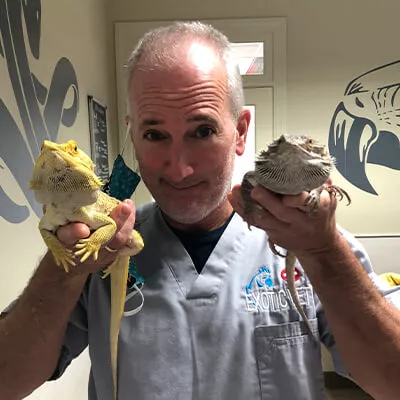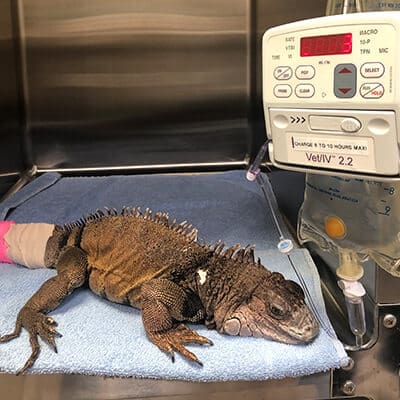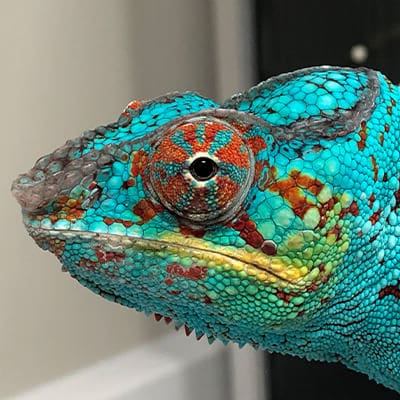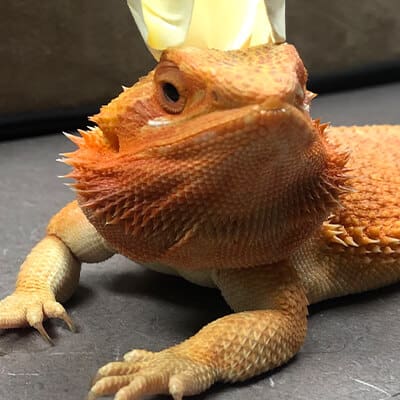Our Bearded Dragon VetCare Package
If you’re the owner of a bearded dragon (or several), we recommend taking advantage of our Bearded Dragon VetCare Package to make your pet’s care affordable and give you peace of mind about their health. We know that the first few months of owning a bearded dragon, especially for new owners, can be difficult, and this package helps to take the uncertainty out of providing for their needs. However, experienced “beardie” owners can also greatly benefit from the package.
The VetCare Package is unique in that instead of being a monthly or even yearly renewing plan, it is a one-time fee for a package of services.
Disclaimer:
- Our VetCare Packages are for healthy pets only
- Because the VetCare Packages are already discounted, they cannot be purchased with CareCredit or Scratchpay, and no coupons or other discounts can be applied
This Package Includes
- Comprehensive Health Checkup Bearded dragons do a good job of hiding sickness, which is why you need a veterinarian to examine them on a regular basis to make sure they’re healthy.
- Intestinal Parasite Screen We need to check your bearded dragon for pinworms, tapeworms, roundworms, coccidia, giardia, and other harmful parasites.
- CBC (Complete Blood Count) The CBC blood test allows us to check your pet for anemia, inflammation, and other issues.
- Adenovirus Screen Adenovirus, or “wasting disease,” can be life-threatening for your bearded dragon. Screening your pet for this virus can help us treat them sooner if they happen to be infected.
- Nail Trim Trimmed nails are safer and more comfortable for your bearded dragon.
- Package Add-Ons Blood Chemistry Panel:
Standard $160, as Package Add-On $120
Blood Chemistry Panel: Blood chemistries can reveal any issues related to tissue and internal organ dysfunction and help to detect diabetes, kidney disease, liver disease, and other disorders. - $330 With our Bearded Dragon VetCare Package,
you receive $395 worth of care for only $330. - How do I sign up for a VetCare Package? Purchase online, then make reservation online

In Case of an Emergency

Signs your lizard is unwell and potentially having an emergency include:
- Keeping eyes closed
- Unable to grasp
- Weak and/or unresponsive
- Breathing through their mouth
- Shaking or twitching
- No appetite
- Regurgitation or vomiting
- Bloody droppings
- Prolonged straining to pass an egg or stool
Call our hospital immediately at (843) 216-8387 if you notice any of these issues with your pet.
Wellness Care for Your Lizard

Common Diseases and Conditions We Treat
Some of the most common problems our reptile patients present with are:
- Diminished appetite
- Metabolic issues
- Foreign object ingestion
- Parasites
- Reproductive disease
Harmful Diseases that Affect Reptiles
Adenovirus (wasting disease): A highly contagious viral disease prevalent among bearded dragons, for which they should be screened regularly.
CANV (yellow fungus disease): Another disease common in bearded dragons. Mainly affects the skin, but can also harm the bones, joints, and internal organs. Can be deadly if not treated early.
Metabolic bone disease: MBD often results from a calcium and vitamin D deficiency, and lack of access to sufficient UVB light. Other factors include inappropriate temperatures, dehydration, and liver disease. Clinical signs of this disease include limb and spinal deformities, lethargy, and anorexia.
Parasites: Parasites common in lizards include pinworms, coccidia, and flagellates. We can detect them with a microscopic fecal analysis performed in our lab, and prescribe the appropriate treatment.
Reproductive disease: Female lizards are often affected by reproductive diseases. Clinical signs include decreased appetite, lethargy, and a distended abdomen. One curative option is to perform an emergency spay on the female. Otherwise, we recommend a prophylactic spay to prevent reproductive issues before they can start.
Salmonella: Salmonella bacteria can be found in the intestinal tracts of virtually all reptiles. The bacteria are continuously shed in the reptile’s feces, so we do not recommend handling by small children and people with weak immune systems. Always practice good hygiene when handling/living with reptiles.
Lizard Care Handouts
For more important information about caring for your lizard, consult our handouts below.
- Bearded Dragon Care
- Bearded Dragon Care (Spanish)
- Blue Tongue Skink Care
- Chinese Water Dragon Care
- Collared Lizard Care
- Iguana Care
- Leopard Gecko Care
- Leopard Gecko Care (Spanish)
- Panther Chameleon Care
- Savannah Monitor Care
- Tegu Care
- Uromastyx Care
- Veiled Chameleon Care
- UV Light Information


